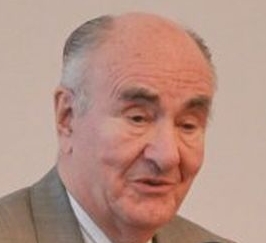László Ormai
In 1954, he joined the Central Statistical Office (KSH), which was and remained his only job. Initially, he worked on statistics on oil mining and oil processing in the Department of Industrial Statistics. In 1958, he defended his doctoral dissertation, the topic of which was the analysis of technical and economic indicators of the petroleum industry.
From 1959, as head of the Organization and Programming Department of the Central Statistical Office's Computer Center (due to the requirements of computer technology), he had to build a bridge between statisticians and computer technology specialists. After his appointment as director of the Central Statistical Office's Computer Technology Directorate in 1962, he worked hard to change the attitude and adaptation of statisticians to computer technology and computer technology specialists to statistical work in accordance with the needs of the time.
He served as Director of the Computer Engineering Directorate of the Central Statistical Office for 18 years between 1962 and 1980. The initial punched card processing was replaced by work with an ICT 1904 type machine in 1966 and then with an IBM 370/155 mainframe in 1974, which required him to ensure continuous training and willingness to cooperate in both areas. Soon, one of the country's most outstanding computer engineering specialists worked under his supervision at the Central Statistical Office.
Adaptation was more difficult on the statistical side. Therefore, in 1980, the Statistical System Development and Coordination Department of the Central Statistical Office was established, and he was entrusted with its management (while he supervised the Central Statistical Office's computer center for another 10 years). Here, he had to face a new task: with the involvement (cooperation) of departments that had operated separately in their methodology and conceptual system in previous decades, he had to create a unified national statistical data collection and data processing system, which was coordinated in its content, operation, conceptual system and computer applications and met the requirements of the new technology. He successfully solved this task, even taking on the conflicts during the negotiations. He also considers it a personal success that, with his participation, in the early 1990s, he received a significant amount of money under the PHARE program to modernize the Central Statistical Office's machinery. The IBM computer park was replaced with Hewlett-Packard equipment, making it possible to eventually have networked personal computers on the desks of every statistician (including those at regional directorates).
He is considered one of the domestic pioneers of the statistical application of computer technology. Through decades of persistent work, he has achieved that the majority of statisticians use and exploit the possibilities offered by computer technology as a daily routine.
Between 1975 and 1984 he was the chairman of the Supervisory Board of the National Association of Hungarian Students.
He retired in 1994; from then on, as president of the Statisztika Petőfi Sport Club, he mainly dealt with sports matters.
Professional awards: Neumann Prize (NJSZT, 1985); Silver Cross of Merit of the Republic of Hungary (2001); Civilian Category of the Knight's Cross (2010); Lifetime Achievement Award (NJSZT, 2012); Fényes Elek Prize (KSH, 2016).
- Since 1954, he led the table tennis department of the Statisztika Petőfi Sport Club, with whose women's team he achieved his first great success in 1968 by winning the Hungarian NB I; they won a total of 25 European Champion Teams' Cups (BEK) and 40 Hungarian team championships. He was a defining figure in Hungarian table tennis, coach and captain of the youth and adult women's national teams, president of the Coaching Committee, professional vice-president of the Hungarian Table Tennis Association (1962-2006), and honorary president from 2007. In 1973, he received the title of master coach. After his retirement, he acted as president of the Sport Club.
- He taught at the College of Physical Education (CF) from 1966, where he became an associate professor in 1985. He was the president of the Hungarian Coaches Association between 1996 and 2016, and also held this position at the Master Coaches' College between 1990 and 2016. He was then the honorary president of both bodies.
- In 2016, he and his wife received the Order of Honour from the European Table Tennis Federation for the development of the women's sport. His other awards include: Silver Javelin Award (Hungarian Physical Education and Sports Council, 1982); MOB Lifetime Achievement Award (Hungarian Olympic Committee, MOB, 2000); Béla Bay Award (Ministry of National Resources, 2001); Lifetime Achievement Award for Women's Sports (MOB, 2019).
- In 2010, a Table Tennis Hall was named after him in Budapest.
Created: 2019.09.27. 08:08
Last modified: 2024.03.31. 15:45

